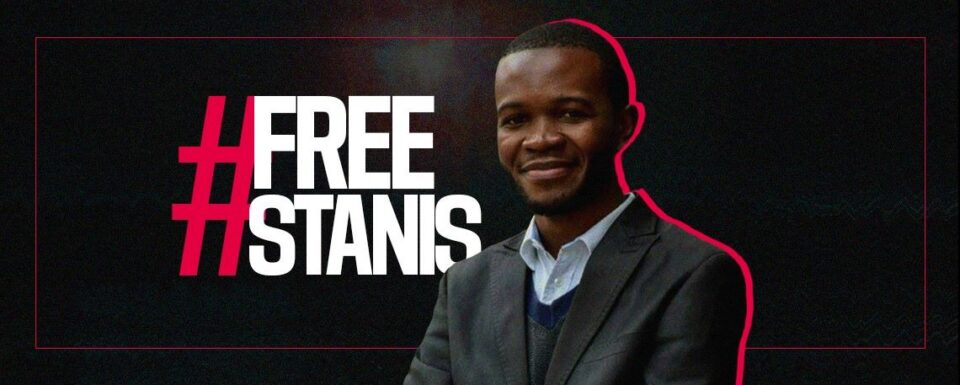PHOTO: Journalist Stanis Bujakera
A reporter held in the Democratic Republic of Congo since 8 September is due to appear in court again on 3 November on a clearly trumped-up charge of fabricating an intelligence agency memo and sending it to Jeune Afrique, the Paris-based news magazine he works for. Several sources confirmed to Reporters Without Borders (RSF) that the memo really was written by the DRC’s National Intelligence Agency (ANR).
It took RSF only a few days in Kinshasa to discover that the reporter, Stanis Bujakera, was not even the first person to obtain the memo that Jeune Afrique used as the basis of a story on 31 August asking whether an army intelligence agency – known as the Military Detection of Anti-Patriotic Activities (DEMIAP) – was responsible for opposition politician Chérubin Okende’s murder in July. The memo had been circulating among security specialists, embassies and certain media outlets before Bujakera and Jeune Afrique learned of it.
“If the prosecution had really wanted to identify the provenance of this memo, it could have easily established that it was already in circulation before Stanis Bujakera obtained it. Given that the accusations do not hold up, what are those who decided to arrest this journalist really seeking? With a trial now under way despite the total absence of incriminating evidence, Bujakera should at the very least be released so that he can defend his honour and integrity as a free man.
Arnaud Froger
Head of RSF’s investigation desk
In an email sent in early September to Jeune Afrique and Radio France Internationale, which also ran a story based on the same memo, Congolese interior ministry Peter Kazadi said an “internal examination” had confirmed the memo was false. It was “unduly attributed to the ANR” to “disorient public opinion,” he wrote. When RSF asked him on what evidence this denial of authenticity was based, he did not respond.
“A memo to superiors,” ANR source said
Two security sources who are familiar with the internal workings of the ANR confirmed to RSF that the memo was in every way similar to what the ANR would normally write about this type of event. “In the army, they call it an information bulletin or an incident report,” a senior officer said. This source, who asked not to be identified, said the memo did not necessarily reflect the ANR’s final opinion on the opposition’s politician’s murder, the opinion that it would pass to the president. But he was convinced that it was a genuine ANR memo.
When contacted, an ANR officer described the document as a “memo to superiors pending verification, analysis and meticulous investigation.” As source close to the president’s office said: “Everyone knows it comes from the ANR, probably from a lower level to then be processed.” Several diplomatic sources questioned by RSF also said they received the memo in August. “It’s authentic,” one said. “It will be difficult to talk of a false report.”
Victim of a war within the ANR?
Jeune Afrique was not even the first media outlet to carry the ANR memo’s explosive claim that an intelligence agency murdered Okende, the opposition politician. Léon Nembalemba, a parliamentarian with the ruling coalition, offered his own version during a live appearance on Molière TV on 5 August, several weeks before the Jeune Afrique story. Denouncing intelligence agency “incompetence,” he said Okende had been “kidnapped and beaten to death” by an agency that then resorted to a “cookie-cutter” attempt to make it look as though he was killed in his car.
Who had an interest in circulating the memo? The ANR? In order to accuse a rival intelligence agency, the DEMIAP? Not necessarily. Several security sources told RSF that the ANR was riven by internal struggles and that the memo was circulated with the aim of discrediting its boss. The memo, which RSF has seen, is dated 14 July. The ANR’s general administrator, Jean-Hervé Mbelu, was fired on 1 August. Was this just a coincidence? When RSF asked Mbelu, he declined to respond.
Consequences have been visible within the ANR in recent weeks. According to several sources, including sources within the ANR, sanctions have been adopted within the agency as a result of the memo’s circulation, constituting additional confirmation that the memo was not forged. This is an “internal ANR matter,” several persons told RSF in the course of this investigation. Internal maybe, but not without consequences for Bujakera, who has been detained for nearly two months.
The hearing that is due to be held on 3 November will be the third since Bujakera’s trial began.

